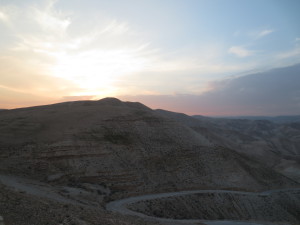The Jordan Valley: a paradise lost [12]
settembre 20, 2014 in Palestina, Traduzioni da Anna Zorzi
Written by Sonia Trovato, translated by Anna Zorzi![]()

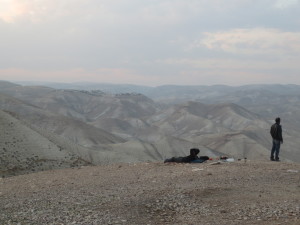 Saturday, 4th January: the last day in Palestine. It might be like the last day of a school trip, but the intense emotions of this full week are completely different from the euphoric feelings before the last night of an educational trip. Today you’ll be in the Jordan Valley, a sort of Campania Felix of the Middle East: a long stretch of sea, mountainous land and rocky desert in an almost tropical climate. Mike, your guide, is on the coach with you and as the driver starts the engine he starts the long description of this area and its crucial importance for Israel. The key words are land and, above all, water. In accordance with the unfair Accords of Oslo, which are only respected as for the division of the West Bank into zones but which are disregarded when it comes to the acknowledgement of the State of Palestine, the Jordan Valley belongs to the C zone, under the civil and military administration of Israel. And the scenery in front of you tells you why: the Jordan valley is a paradise! It has got a Caribbean climate all year long, which allows its people not to interrupt the farming season. And it has got water, lots of water from the Jordan River.
Saturday, 4th January: the last day in Palestine. It might be like the last day of a school trip, but the intense emotions of this full week are completely different from the euphoric feelings before the last night of an educational trip. Today you’ll be in the Jordan Valley, a sort of Campania Felix of the Middle East: a long stretch of sea, mountainous land and rocky desert in an almost tropical climate. Mike, your guide, is on the coach with you and as the driver starts the engine he starts the long description of this area and its crucial importance for Israel. The key words are land and, above all, water. In accordance with the unfair Accords of Oslo, which are only respected as for the division of the West Bank into zones but which are disregarded when it comes to the acknowledgement of the State of Palestine, the Jordan Valley belongs to the C zone, under the civil and military administration of Israel. And the scenery in front of you tells you why: the Jordan valley is a paradise! It has got a Caribbean climate all year long, which allows its people not to interrupt the farming season. And it has got water, lots of water from the Jordan River. 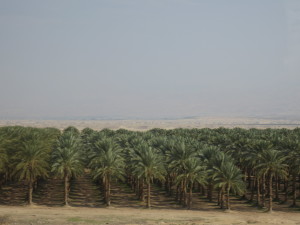 The middle east area is dry and barren so the Israeli government has developed a monopoly on the water supplies out of “security reasons”: the route of the wall has incorporated the wide groundwater table of the provinces of Jenin, Tulkarem and Qualqilya into the Israeli land. Hence the loss of the access for the Palestinians to about fifty wells. Moreover, according to a law of 1967, when the occupation of the West Bank started, Palestinians are prohibited from building water infrastructure without Israeli permission. This way Israel ensures itself the exploitation of 80% of the water in the West Bank and compromises Palestinians’ hygiene, health and economy, which is basically an agricultural one. And of course, the basin of the river Jordan supplies water to the illegal settlements and to their vast date plantations in a land which otherwise would be inhabited by the Bedouins only.
The middle east area is dry and barren so the Israeli government has developed a monopoly on the water supplies out of “security reasons”: the route of the wall has incorporated the wide groundwater table of the provinces of Jenin, Tulkarem and Qualqilya into the Israeli land. Hence the loss of the access for the Palestinians to about fifty wells. Moreover, according to a law of 1967, when the occupation of the West Bank started, Palestinians are prohibited from building water infrastructure without Israeli permission. This way Israel ensures itself the exploitation of 80% of the water in the West Bank and compromises Palestinians’ hygiene, health and economy, which is basically an agricultural one. And of course, the basin of the river Jordan supplies water to the illegal settlements and to their vast date plantations in a land which otherwise would be inhabited by the Bedouins only.
The Jordan River separates Palestine from Jordan and is revered by Christians as the place where Jesus was baptized, according to the Biblical tradition. 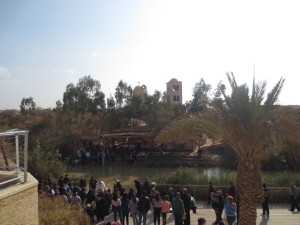 Every day lots of tourists in white tunics plunge into its waters, which are muddy because of the wastes from the settlements, as Mikes tells you. The border between the two lands is marked by Jordan soldiers on one side and Israeli soldiers on the other , instead of the Palestinian ones ! The devoted pilgrims don’t look annoyed by the presence of the military. And you, once got off the coach, look completely different from the pilgrims on the river banks: they in their white coats waiting for their holy immersion into the river, you with a Kefiah around your necks and bracelets around your wrists to show solidarity with the victims of this cruel, capillary occupation. What’s that asks a soldier, pointing at the wrist of one of the group. – It’s a bracelet – Luca replies. – and those colours? – adds the soldier. It’s the Palestinian flag.- Palestine? I know no Palestine- says the soldier. Netanyahu would be proud of this answer: this is the result of the brainwashing which, as we have been told by the scholar Nurit Peled-Elhanan, starts from an early age; the dude in camouflage will have a successful career.
Every day lots of tourists in white tunics plunge into its waters, which are muddy because of the wastes from the settlements, as Mikes tells you. The border between the two lands is marked by Jordan soldiers on one side and Israeli soldiers on the other , instead of the Palestinian ones ! The devoted pilgrims don’t look annoyed by the presence of the military. And you, once got off the coach, look completely different from the pilgrims on the river banks: they in their white coats waiting for their holy immersion into the river, you with a Kefiah around your necks and bracelets around your wrists to show solidarity with the victims of this cruel, capillary occupation. What’s that asks a soldier, pointing at the wrist of one of the group. – It’s a bracelet – Luca replies. – and those colours? – adds the soldier. It’s the Palestinian flag.- Palestine? I know no Palestine- says the soldier. Netanyahu would be proud of this answer: this is the result of the brainwashing which, as we have been told by the scholar Nurit Peled-Elhanan, starts from an early age; the dude in camouflage will have a successful career.
The next leg of your journey in the Jordan Valley is a school, a drab building in the middle of nowhere, built with the support of the UNICEF. Two classrooms, one for boys and one for girls, are home to about 50 children, who look forward to being photographed. Their enthusiasm is touching and overwhelming: they can be happy even if they have very few toys. While some of them want to take pictures themselves you have a quick glance at two or three girls of the group and they glance back at you and it is instant empathy because you feel deep inside yourselves that they will never regret the choice they have made to take care of and teach these children, whose gratitude is and will be their most precious reward.
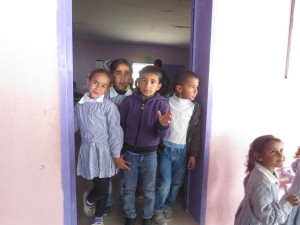 Mike talks on until you reach Jericho, “the City of palm trees”, seat of the oldest tree in the world and of the Monastery of Temptation. After you have bargained with the taxi driver over the price of a ride to the top of the hill where the Monastery lies (but what a terrible ride for eight people in a five-seat taxi along a narrow, dirt track!), you are in front of the Monastery, but its doors are barred. Disappointed at the failure to visit the monument, you meet Miguel, a Spanish boy Mike will give a lift to as far as Bethlehem and you will chat with about the Italian politics (Miguel has been to Italy on one of the Erasmus cultural projects). But this doesn’t draw your attention. This journey marks a watershed in your mind, it establishes what comes first and what comes next, it gives you a new perspective of the priorities of life. Because of you/nothing is normal in my life/nothing is neutral/nothing is banal/or even meaningless writes Suad Amiry in the last chapter of Golda slept here , where you refers to Palestine, which is occupied, but which at the same time occupies her and all Palestinians as an obsession.
Mike talks on until you reach Jericho, “the City of palm trees”, seat of the oldest tree in the world and of the Monastery of Temptation. After you have bargained with the taxi driver over the price of a ride to the top of the hill where the Monastery lies (but what a terrible ride for eight people in a five-seat taxi along a narrow, dirt track!), you are in front of the Monastery, but its doors are barred. Disappointed at the failure to visit the monument, you meet Miguel, a Spanish boy Mike will give a lift to as far as Bethlehem and you will chat with about the Italian politics (Miguel has been to Italy on one of the Erasmus cultural projects). But this doesn’t draw your attention. This journey marks a watershed in your mind, it establishes what comes first and what comes next, it gives you a new perspective of the priorities of life. Because of you/nothing is normal in my life/nothing is neutral/nothing is banal/or even meaningless writes Suad Amiry in the last chapter of Golda slept here , where you refers to Palestine, which is occupied, but which at the same time occupies her and all Palestinians as an obsession.
Before you go back to your hotel and start packing, there are still two places to visit: the first one is the Dead Sea and the second one is a small Bedouin settlement. The stop at the Dead Sea is disappointingly quick: metres of barbed wire and warning and admission fee signs oblige you to admire the sea from a distance. On the contrary, the visit at the Bedouin camp fills you with emotions. Three barefoot children trot around you, one of them, the thinnest, pulls you by your finger and asks you for “Something”. 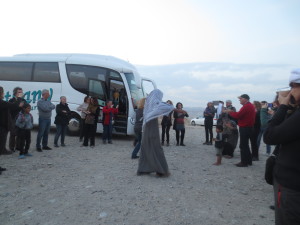 It’s the last day, you have no money or food left, but then you remember buying a kilo of nuts at a stall on the way to Nablus. It will be a mere trifle to him – you think , but the child rejoices with endless “Thank you, thank you” and clings the bag of nuts tightly to his chest , as if it were the most valuable thing in the world. Watching him is pure happiness. For a moment you all look around and enjoy the breathtaking view of the scenery: you feel detached from everything and everybody, the silence is surreal, you are in the middle of the desert, the utmost Nothing surrounds you. There are no illegal settlements, no checkpoints, no soldiers, no date plantations, no forms of life. Are still there places like this in your metropolitan countries? A joyful Arab song interrupts the quietness: it comes from your coach and sends everybody into a sort of ecstasy and frenzy. Mike, usually so modest and composed, gives way to a liberating group dance with the Bedouins too. If there wasn’t the horrible nightmare of the interrogation at the “Ben Gurion”, the journey to Palestine would end like this, with a picture of hope and attachment to life, feelings which are completely unknown to the rigid officers at Tel Aviv airport.
It’s the last day, you have no money or food left, but then you remember buying a kilo of nuts at a stall on the way to Nablus. It will be a mere trifle to him – you think , but the child rejoices with endless “Thank you, thank you” and clings the bag of nuts tightly to his chest , as if it were the most valuable thing in the world. Watching him is pure happiness. For a moment you all look around and enjoy the breathtaking view of the scenery: you feel detached from everything and everybody, the silence is surreal, you are in the middle of the desert, the utmost Nothing surrounds you. There are no illegal settlements, no checkpoints, no soldiers, no date plantations, no forms of life. Are still there places like this in your metropolitan countries? A joyful Arab song interrupts the quietness: it comes from your coach and sends everybody into a sort of ecstasy and frenzy. Mike, usually so modest and composed, gives way to a liberating group dance with the Bedouins too. If there wasn’t the horrible nightmare of the interrogation at the “Ben Gurion”, the journey to Palestine would end like this, with a picture of hope and attachment to life, feelings which are completely unknown to the rigid officers at Tel Aviv airport.

